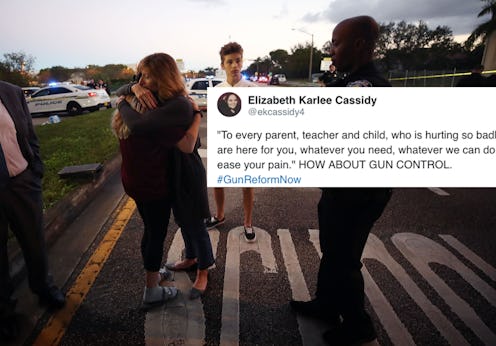News
Trump Said He’ll Do “Whatever You Need” After The Shooting & America Said GUN CONTROL

President Trump spoke to the nation Thursday morning, addressing the latest mass shooting at a high school in Parkland, Florida. But plenty of Twitter users expressed their frustration with the common Republican refusal, exemplified in Trump's speech, to even mention the idea of gun control. "We are here for you, whatever you need," he said. "Whatever we can do to ease your pain." And many Americans responded to Trump's speech by taking that promise to heart and saying, "We need gun control."
The latest mass shooting at Marjory Stoneman Douglas High School marks one of the 10 deadliest in recent U.S. history, with 17 fatalities and over a dozen more sustaining serious injuries. Some suspect the deadliness of the attack came in part due to the shooter's familiarity with the school's lockdown procedures and bell schedule, as he was a former student himself.
For those who believe gun control can prevent such incidents, Trump's speech Thursday came across as hollow. He focused on mental health, saying the federal government is "committed to working with state and local leaders to secure our schools" and deal with those suffering from intense mental illness.
Trump's speech contained no call for a gun control discussion, and as some have pointed out, Trump did away with a regulation put in place under President Obama to make the purchase of firearms more difficult for those with serious mental health struggles.
So, when Trump said they'd be there for "whatever you need," some Twitter users had an answer ready: gun control.
For many, the debate about gun control seems to surface and scuttle about after each mass shooting, before being summarily abandoned as the news cycle moves on.
The frustration over what seems to be a diminishing amount of public attention given to each subsequent tragedy can feel palpable amongst those invested in making changes to U.S. gun policy.
There's also the obvious partisan disconnect between Republicans and Democrats over the root cause of mass shootings, as well as how to go about preventing such incidents in the future.
For many Democrats, the answer is all too obvious — gun control. But Republicans are wary of passing even basic restrictions on guns, concerned that such a move puts them on a "slippery slope" to much more stringent regulations.
And then, of course, there's the National Rifle Association. America's largest gun lobby has lately upped its political expenditures.
Consider that the NRA gave nearly three times more money to Trump's campaign in 2016 than to that of Mitt Romney in 2012, despite virtually no difference in the two candidates in terms of their pro-gun stance.
Because the NRA gives money almost exclusively to Republicans, their lobbying efforts make it all but impossible to decipher the real, genuine stances of individual GOP politicians. But in the world of actual legislation, what matters is what can get passed through Congress and signed by the president.
And with Republicans controlling the House, Senate, and Oval Office, the immediate prospects of gun control legislation are pretty much nonexistent.
Money isn't the only factor. As Jeff Stein laid out at Vox, Michael Bloomberg raised enough money through the pro-gun control organization EveryTown that he was able to offer substantial sums to Republican politicians who would vote for gun control legislation. But those efforts met with little success.
This all leads to the possibility that the real reason behind the apparent no-go on gun control is the voting base. For many Republican politicians, a meaningful segment of their core voters are enthusiastically involved with and/or supportive of the NRA. To back gun control in any form would be to abandon those key votes, which might amount to political suicide.
Of course, elections change things. So for those who believe gun control is the answer to Trump's "whatever you need" promise, voting non-NRA-affiliated politicians into office may be the only solution.